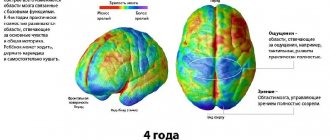An ancient wisdom says: “Genius is one percent patience and ninety-nine percent perspiration.” A man of genius, possessing talent and amazing mental abilities, is rare. Insight, as the highest degree of genius, allowing one to make unique discoveries, is not the result of learning.
Recognized genius - Albert Einstein
Genius and a brilliant person
A genius is a person who has a number of distinctive qualities. These individual traits include:
- intuition - the ability to comprehend the truth without any inferential processes;
- fantasy – the power of imagination;
- creativity is an activity aimed at creating something completely new.
Important! A genius, possessing all the knowledge of the cultural heritage of his ancestors, is not afraid to step over old norms and open unknown horizons in his field of creation.
Genius is the greatest degree of personal talent that a person realizes in his work activity.
Vivid imagination
Another important sign of genius is the presence of a vivid imagination. Variability and genius go hand in hand precisely because a true genius always has an immense inner world in which he can move from one sphere of activity to another. But at the same time, you can rest assured that everything that such a person undertakes will turn out to be something unusual and surprising. The reason, again, lies precisely in the imagination, which, coupled with non-standard thinking, allows a genius to come up with something that the average person’s brain would never have thought of in life. However, this is also why genius and insanity are linked. The colors of the imagination are sometimes too bright, which is why a person who is unable to control himself can drown in his own inner world, going crazy. This is the sad fate of many geniuses who could not cope with the burden of their gift and their burden.
Concept in psychology
If society defines genius as a spark of God, then psychoanalysts consider it the fruit of a defense mechanism of the psyche - sublimation. When such protection, which is responsible for relieving internal stress, is triggered, the overvoltage energy is directed toward achieving social goals. According to psychologists, a genius person is capable of insight.
Choleric - what kind of person is this?
By the way. Insight is a breakthrough on an intuitive level when solving a given intellectual problem.
From a psychological point of view, the state of genius is nothing more than a deviation from the norm. It has a genetic predisposition and sometimes borders on madness. Such people may have low emotional intelligence, which contributes to the development of bipolar affective disorder and schizophrenia. In this case, it is the disease that helps create brilliant masterpieces.
Noticed. Geniuses are “people not of this world” and are often not adapted to ordinary life. They are so passionate about what they do that they live in the gestalt moment (“here and now”). Such individuals are helpless in everyday situations and sometimes cannot find a common language with other people.
Genius and madness
Intuition
If you have read everything that was described above regarding genius, then you yourself could come to the conclusion that intuition is an integral part of the life of a genius. He needs to be able to feel the situation and trust his gut, because it is this that tells him the best decisions he can make. Genius allows a person, when a controversial situation arises, not to turn to books (or in modern realities, rather, to a search engine). Such a person can simply look into his inner world, find the answer there and trust his intuition, even if he is not sure that his answer will be correct. Perhaps his answer will be wrong by the generally accepted standard, but in the end it will come out as another brilliant idea. This is exactly how genius works. Giftedness, as you can imagine, doesn't work like that at all, which is why you can't compare gifted people with geniuses. These are two completely different categories.
Where does the word "genius" come from?
Pessimist - what kind of person is this?
In Latin this word will be written as genius, translated as “spirit”. Even in the mythology of ancient Rome, there were spirits - geniuses (personal to humans). It was believed that especially outstanding people had a strong personal spirit. Therefore, since the time of Gaius Julius Caesar (Octavian Augustus), this word has become synonymous with the words “inspiration” and “talent.”
Interpretation of the word
Pointless activities
Throughout history, it can be traced that all geniuses were engaged in such things that their contemporaries considered these activities to have no meaning.
— In 1864, the English chemist John Alexander Newlands came up with the first periodic table of the elements, arranging all the elements known in chemistry in a table by atomic weight. For this he was ridiculed! “ The Wright brothers, who designed the first airplane and invented the aircraft control system that they still use today, were also ridiculed. — The father of the founder of genetics, Gregor Mendal, was generally ignored by the scientific community.
The brain of a genius doesn't see the world the same way as the rest of humanity, so "mindless activities" are essential to progress.
Types of genius
Idealist - what kind of person is this?
Who is a genius? Is it clear what are the types of this unique condition? The following forms of its manifestation are distinguished:
- emotional;
- creative;
- scientific;
- sports;
- practical;
- household;
- entrepreneurial.
Attention! Separately, two divisions can be distinguished according to the method of implementation. The first is when a person, while remaining ready for something new, can easily switch from one vector of searching for discoveries to another. The second is when a genius works and makes inventions in a narrow way until the end of his life.
Classification
There are several forms of genius.
- Practical. One can say about a representative of this species that he has “golden hands”, is capable of designing, making, repairing or creating something new.
- Household (the rarest form), the presence of skills for life orientation.
- Creative. The owner of such genius has a very developed imagination, knows how to translate his fantasies into reality, and realizes himself in the creative process.
- Entrepreneurial, the ability to attract money.
- Scientific and academic, the acquisition of great achievements in studies and scientific activities. They may say about such a person that he has a “bright mind.”
- Emotional, the presence of developed empathy, the ability to feel and understand other people.
- Sports-physical, high development of physical strength, agility, endurance and flexibility.
It is also worth considering two types of genius, based on the scale of its implementation:
- the first category are people who are constantly open to new things,
- the latter are fixated on the same activity, which they continue to improve and hone until the end of their lives.
The main signs of a genius
If a person is called a genius, what does this mean is already clear, but how can he be identified among other people?
For your information. According to statistics, there is one recognized genius for every 50 million people. For example, geneticists say that only one potential genius can be born per hundred thousand newborns.
Despite the small percentage of geniuses in society, such a person can be identified by the following parameters:
- a special state of mind combined with innate abilities;
- using intuition;
- perseverance and self-confidence;
- innovative thinking;
- understanding of vocation and its productive implementation in a certain area.
It has been noticed that some of these amazing people focus on one thing in childhood. They may fall behind in other subjects at school or even fail the school curriculum.
Interesting. Albert Einstein was considered a retarded child and did not do well in elementary school. Maxim Gorky did not write school essays at all and completed only two classes.
Innate signs of genius are not enough; they must be identified and developed.
How to recognize a genius by date of birth, neuroses and grades at school
The approach, if you think about it, is quite workable: we take geniuses, identify common traits in character, physiology and living conditions, generate the same in some child, and - voila: be familiar - a genius.
And no divine sparks, kisses or other free gifts from above for you - mysticism has no place in the laboratory. Atheistic, of course, but, on the other hand, why not? What if it works?
I recognize him by his bone
But first, about what science has once again discovered there. And what she found was chaos, swearing and night vigils. That is, super-talented people, as the publication Curious Mind claims, and along with it some unnamed American scientists, do not tend to bother with cleaning the territory around them (since they can freely navigate the everest of papers and garbage); they swear like sailors (the brains of such people work extremely quickly and do not waste time searching for correct answers to stupid questions) and go to bed well after midnight (disruption of circadian rhythms is common among geniuses).
It’s interesting, of course, but somehow a little small: we have such geniuses in packs in every high-rise building... To clarify another vital feature, some suggest taking off the shoes of a potential genius, especially if he has long left the youth league.
If traces of gout are found, there is a reason to dig further. After all, since the 18th century, gout has been called a disease of the smartest people, great commanders and extraordinary politicians.
Ashton Kutcher has clearly gone overboard in his quest to be like Steve Jobs. / Photo: www.facebook.com/thejobsmovie
The most interesting thing is that two centuries later, the long-standing conclusions were once again confirmed by physician Henry Havelock Ellis. He wrote a book, A Study of British Genius, in which he reported that 55 out of 1030 great Englishmen suffered from gout. The ratio seems to be so-so, but usually 0.3% of the population suffers from this disease, but here it turned out to be as much as 5.3%. By the way, there really were plenty of gouty people among the greats: Alexander the Great, Caesar, Charlemagne, Louis XIV, Ivan the Terrible, Boris Godunov, Peter I, Cromwell, Admiral Nelson, Milton, Beethoven, Renoir, Maupassant, Dickens, Turgenev, Chaplin, Darwin, Galileo, Thomas More, Montaigne, Voltaire, Rembrandt, Rubens, Dante, Goethe, Pushkin, Tyutchev, Blok, Leibniz, Newton, Kant... And the list can be multiplied further. An explanation was soon found for the strange pattern.
It's all about uric acid, the salts of which are deposited in gouty joints and cause the disease. The formula of this acid is very similar to the formulas of caffeine, theophylline and theobromine - known stimulants of mental activity and the ability to concentrate. An ordinary person, God forbid, accumulates one gram of this acid, but geniuses have at least 20–30, so it seemed to stimulate them thoroughly.
However, pumping your joints with harmful salts to generate genius is, you see, not very humane. It's better to pay attention to appearance. They say everything is written there too.
“Geniuses quite often have a head like a light bulb,” physiognomist Oleg Voevodin explained to VM. — A form in which there is an expansion of the skull in the area of the temples or forehead is a sign that a person can easily come up with something new, create, create. Such heads were, for example, in the Nobel chemist Albert Hofmann, Mozart, Lenin, Newton, and many others... Often there are also deep-set eyes (far-sightedness), wrinkles on the forehead, straight (defending their point of view) or “broken” (holding everything under control) eyebrows, as well as slightly shifted to the left, towards the left hand, the crown (insight), nose (openness to the world) and chin (effectiveness). If we look at the ears of geniuses, then, most likely, we will see that the antihelix will seem to dominate, protruding strongly above the helix - a sign that a person selflessly gives himself to the world. A genius who is awaiting recognition will be given away by two front incisors, which will be larger than the rest of the teeth; in an unrecognized one, these teeth will be, as it were, sunken.
Sit down, two
Studying your passport will also make its own adjustments. For example, according to TsAGI engineer Evgeny Vinogradov, who analyzed the biographies of 1008 of the most outstanding personalities of all times and eras, they were 1.32 times more likely to choose a cold season for birth than a warm one. Moreover, the main emphasis was placed on February (55% more often than all other months).
Vinogradov explains this “brilliant grouping”, firstly, by a more correct diet of mothers (most of pregnancy occurs in summer and autumn, rich in vitamins), as well as by solar and oxygen activity, whose total impact is strongest in February. By the way, the researcher did not stop there and meticulously calculated that the most geniuses were born at the end of Tuesday, the beginning of Wednesday and the first half of Saturday. In general, with the current level of medicine and obstetric care, guessing the date of birth of a genius is a piece of cake.
But it’s not enough to give birth to a genius—you also need to organize a problematic family for him, researchers say. For example, you can send one of your parents somewhere (Napoleon, Gandhi, Stendhal, Rousseau, Byron, Nelson Mandela and at least 600 other greats), or you can send both of them at once (Steve Jobs, Coco Chanel, John Lennon, Bach, Leo Tolstoy , Rousseau, Edgar Poe, Kuindzhi...). The oppressive upbringing can also be taken into account: Pushkin had a hot-tempered mother, Belinsky was beaten, Beethoven was forced to play music until exhaustion, Chekhov was flogged for any reason...
Ashton Kutcher has clearly gone overboard in his quest to be like Steve Jobs. / Photo: www.facebook.com/thejobsmovie
It is not surprising that approximately 85% of geniuses ended up not being the most balanced people. And with such stress there is no time for studying and good behavior. The same Chekhov stayed in the second year at least twice (due to geography, arithmetic and Greek), Edison, Churchill, Einstein and Bill Gates were inveterate losers, Sergei Korolev and Pushkin, Napoleon and Brodsky, Balzac, Tsiolkovsky did not shine at school , Leo Tolstoy, Mendeleev (this one, however, under threat of expulsion, still improved his studies)…
Actually, everything is explained simply: genius and the notorious IQ most often are not even close. Repeated large-scale studies have shown that children with a high IQ in adulthood create strong marriages, have excellent jobs, a decent standard of living - in general, they socialize well. However, none of them were ever “convicted” of making any serious cultural or scientific contribution to the common treasury of humanity.
An explanation for this illogicality has also already been found. As a rule, “excellent students in life” obediently follow learned algorithms to solve a particular problem, while geniuses gush with a mass of non-standard ideas, blazing completely untrodden paths.
Cockroach race
As for the notorious socialization, well, well, cockroaches in brilliant heads are almost a mandatory thing.
Einstein hated socks. Byron was enraged by the salt shakers. Brahms invoked the muse, endlessly polishing his already polished shoes. Mozart and Hoffmann suffered from persecution delusions. Schiller could not write without rotten apples on the table. Mao Zedong never brushed his teeth. Akhmatova was afraid of open spaces, and Mayakovsky was afraid of infection (he carried a soap dish with him everywhere and tried not to take off his gloves in public places). Van Gogh considered himself possessed by demons, Maupassant periodically saw his double at home. Hallucinations visited Raphael, Kramskoy, Derzhavin and Glinka.
Dostoevsky suffered from epilepsy, Mandelstam - severe neuroses and suicide attempts. Vrubel and Kharms were treated in psychiatric clinics, Schumann, Beethoven, Garshin, Gogol, Rousseau, Nietzsche, Ciurlionis, Handel, Scriabin were not all right with their psyches... And depression and sudden mood swings are generally all of them, geniuses.
The close connection of genius with the problematic “roof” was noticed back in antiquity (“There has not yet been a single great mind without an admixture of madness” - Aristotle), and then many scientists repeatedly returned to the study of this “seal of genius.”
Alfred Einstein, for example, was irritated by... socks / Photo: Wikipedia, public domain
— Yes, it was a whole big movement in psychiatry, many scientists were interested in this topic, being both supporters and opponents of combining genius with madness. Including ours - Segalin, Yudin, Bozhenov, Mints, Galant... - explained “VM” Viktor Khanykov, a psychiatrist at the Federal State Budgetary Institution “National Medical Center for Pedagogical Problems” named after. V. P. Serbsky. - But I'll tell you what.
In the physical body, going beyond the norm usually indicates pathology. In the mental sphere, this can be both a pathology and a supernormal or “other” norm. For example, a higher, synthetic level of thinking or the ability to see the world in other facets, or a more heightened experience of certain things.
We cannot see deviations here, because this is an adequate view of the world, just more vibrant, versatile and focused than that of the average person. Yes, many geniuses were accused of social disadaptation, coldness towards loved ones, and intolerance.
But such behavior is only a consequence of a different hierarchy of values; other things are important for a genius. As a rule, in the area where they worked, these people showed persistence, perseverance, and powerful will. They simply could not do so much if they did not exhibit all these qualities. Which is just uncharacteristic for mentally ill people. In any case, for those suffering from schizophrenia, which is so fond of being attributed to most geniuses.
And the lens through which we, ordinary people, view geniuses is also to blame: “We say: Beethoven had a terrible character, Pushkin was a “pathological” womanizer, Mussorgsky drank heavily,” Khanykov continues. - But how many such people are there among ordinary people? That's it, we just don't pay attention to them - the scale of personality and activity is not the same.
And geniuses are always under a magnifying glass.
Of course, some of them have features similar to manifestations of certain mental illnesses.
For example, to be a genius in science or technology, you must have an unusual view of things, see connections where the ordinary mind does not see them. Psychologists call this “reliance on latent signs”—the alignment of the significant and the insignificant—and is one of the properties of schizophrenic thinking. But for a genius this is necessary and natural.
Education floods our heads with dogmas, and in order to break through them, a genius needs them to be of little significance to him.
Most brilliant creators maintained this open-mindedness throughout their lives, continuing to produce new ideas into old age. In contrast to patients with schizophrenia, whose thinking, and then personality, as a result of the disease, as a rule, quickly move towards disintegration, the will is leveled, and emotions fade.
In the near future, it will not be possible to grow a genius from a test tube / Still from the movie “Watchmen”
The copy is not correct
It is clear that not only psychiatrists, but also other brain scientists are trying to get into the heads of geniuses. For example, by putting them into an MRI machine, neurologists discovered that the brains of creative people are more active during moments of rest. Apparently, this is why many of them claim that brilliant ideas come to them spontaneously, or even in a dream. Some neurophysiologists saw that at the peak of the creative process in people both hemispheres are turned on to the maximum at once, others - that the “error detector” located in the right temporal lobe is switched off in geniuses, others - that their brains are more “muscular”, and still others... there are, of course, the fourths, and the twenties, and the seventies... Does this mean that in the future science will print geniuses at the speed of a mad printer? Not at all.
— There are no objective methods for determining genius, and it is unlikely that they will ever appear. Simply because they shouldn’t exist, says Valeria Strelets, chief researcher at the Institute of Higher Nervous Activity and Neurophysiology of the Russian Academy of Sciences. - Everything is too individual. It happens that children grow up to be child prodigies, and then nothing comes of them. It happens - as in the case of Mozart - they remain geniuses for life.
It happens (my favorite example) - like with Niels Bohr, who was considered mentally retarded, and his twin brother was considered a child prodigy. As a result, no one knows about the second one now, but the first one has become a hero of science. Each person’s brain is unique, everyone accumulates, stores and processes information differently, everyone has their own individual life experience, genetics, hormonal levels and a host of other factors that simply cannot be synthesized. And even more so - put it on stream. So genius will always be an absolutely unique and unique thing.
REFERENCE
In ancient Rome, genius was the spirit that patronized a person or area. The modern meaning - a person with special, almost divine abilities - appeared only in the 18th century.
An international consortium of scientists has presented a plan to reconstruct the genome of Leonardo da Vinci. Since the exact location of his burial is unknown, and science has already learned to extract DNA from things that people touched, scientists - in the hope of unraveling the secret of the genius - are trying to obtain it from fingerprints (for example, in Leonardo's diaries) or from the insides of his paintings.
BY THE WAY
Konstantin Tsiolkovsky proposed creating a network of incubators in Russia for breeding geniuses. He calculated that the system of artificial insemination of women by “superior” men without their participation would produce a plethora of perfect people, and after five generations it would even produce geniuses.
Is it possible to develop genius?
If genius is the highest degree of talent and inspiration, then you need to know what all the steps of this ladder are called. It consists of the following items:
- inclinations – features of the human nervous system, on the basis of which various personality abilities are formed;
- abilities - psychological qualities that allow an individual to easily acquire skills, knowledge and abilities in various fields;
- giftedness is a combination of different developed abilities;
- talent - outstanding abilities that are manifested and polished with the acquisition of experience and subsequently form certain skills;
- genius is the highest form of personality functioning intellectually or creatively.
Only endless hard work put into completing all these levels leads to the final result.
Ability Levels
How to raise a genius from a child
Knowing what genius means, you can, with patience, carefully observe the child in order to initially identify the makings of genius.
Important! A genius, the definition of which is already clear, can grow out of a child. He will not be the one his parents want him to be, but the one inherent in nature.
In simple terms, adults are required to follow a certain methodology, namely:
- initially determine what type of thinking the baby belongs to and identify his abilities;
- do not interfere with the little person’s desire for independent development and refrain from imposing your opinions and ideas;
- support and assist in every possible way the development of charisma and leadership abilities; they indicate high self-esteem and awareness of one’s strengths;
- helping the child, developing self-confidence is a fundamental feeling for the manifestation of talent;
- to form creative thinking and perseverance in achieving goals;
- give the child freedom of choice, be objective and instill the ability not to dwell on the successes achieved.
Carefully. You cannot direct the child’s activities where the parents want. It is important to allow him to choose his own path and profession.
Future genius
Unfulfilled professional dreams of parents, fear of deviating from generally accepted norms of behavior and the task of social adaptation are just a few of the obstacles to the development of a brilliant personality. To become a genius, a person must think and live outside the box. Abnormality, as the public interprets it, is one of the basic signs of genius.
How to become talented?
Millions of minds are struggling to figure out how to recognize their talent. Disclosure of outstanding abilities presupposes their identification of abilities, accumulation of experience and full use. The stages of revealing unique talents are as follows:
- Before finding his talent, a person feels certain inclinations towards a certain area: he is interested in news related to this area, accumulates knowledge, and collects material.
- The stage of deeper immersion in the topic, attempts to copy other people's work.
- Attempts to create something unique, inimitable. If at this stage original works or previously unexpressed ideas are born, it means that talent has been born.
- Full use of identified abilities.
Desire to act
Giftedness, talent, genius - all of this is so similar to each other, however, each of these concepts has its own aspects, and each of them can describe a wide variety of people. And the task of this article is to identify the signs and characteristics of genius that would allow you to know that you have met not a gifted person, not a talent, but a real genius. You have already read about unconventional thinking and vivid imagination, but you should also not forget about the constant desire of a brilliant person to act. Part of this is because genius can lead to madness. If a person keeps everything to himself, closes himself in his imagination and inner world, he instantly goes crazy. That is why a brilliant person always tries to act, always strives to bring his ideas to life. Even if ten, fifty, or one hundred of his ideas turn out to be unusable, dysfunctional, or unpopular, the likelihood is that the one hundred and first idea will be revolutionary. Also, the desire to act in brilliant people is associated with their self-esteem. Talent can be modest and even try to belittle its achievements in one area or another. A genius knows what he is capable of, so he never stops at anything.










